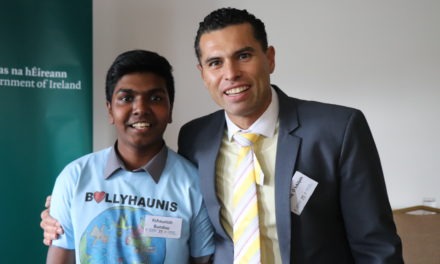– Robert Carey on why everyone, including people working in community-based organisations, should question their beliefs:
What are you being a flat earther about?
There is a scene from the Netflix documentary “Behind the Curve “which is about the growing phenomenon of the Flat Earth Movement. A leading light in the movement informs us that they have recently purchased a “Ring Laser Gyroscope” for a cost of 20,000 dollars with which they will be able to prove that the earth does not move. After setting it up however the device, not unsurprisingly, showed movement (15 degrees per hour for you science geeks) – to which his response was: “We were taken aback, it’s a problem and one which we will set out to disprove.” In other words there is nothing you can do or no evidence you can provide me with that will make me reconsider my position.
The fact that the earth is curved as opposed to flat is in most people’s reality a solid, proven fact and has been for hundreds if not thousands of years. Yet when presented with irrefutable evidence to the contrary, “Flat Earthers” refuse to engage with it and instead seek out any information to try to justify their position.
 This denial of rationality and facts is part of what psychologists call cognitive dissonance. This is the process whereby, when a person is presented with ideas or information which are contrary to their beliefs, this causes a dissonance or discomfort and, in order to restore balance, we sometimes dismiss the new information out of hand and instead seek to justify our existing ideas. This can lead to confirmation bias and an irrational way of thinking.
This denial of rationality and facts is part of what psychologists call cognitive dissonance. This is the process whereby, when a person is presented with ideas or information which are contrary to their beliefs, this causes a dissonance or discomfort and, in order to restore balance, we sometimes dismiss the new information out of hand and instead seek to justify our existing ideas. This can lead to confirmation bias and an irrational way of thinking.
This is dangerous when it concerns big and important issues and it seems to be a rising phenomenon in the world today, which is further facilitated by the internet – because it has never been so easy to propagate a false or just plain stupid idea.
We have seen this across issues ranging from climate change denial, people who deny that racism exists, those who support Trump no matter what he does and recently in the anti-mask protests.

WE NEED TO QUESTION ESTABLISHED NORMS
So what is the role of community development in this: Are we not meant to support community activism and collective action? Do we only support what we agree with? We may be asked for example to support communities to challenge lockdown procedures.
It is true that those working in community development are required to be sceptical, to question the established norms and practices and to empower communities to have a voice. However, there is a difference between scepticism and denial.
Scepticism involves rational analyses and argument and a willingness for your current thinking to be disproved. It is in essence a scientific rational approach.
Denial involves the under-utilisation of your rational faculties, denial of facts and truth. It is in fact a regression to pre-enlightenment days when we looked to superstition and religion for explanations.
OPEN TO NEW PERSPECTIVES
Externally therefore, we need to be willing to continue activism, but only if it is consistent with the values of equality and social inclusion and is well informed, and in this regard we need to be willing to contest misinformation when required.
In Local Development Companies (LDCs) we need to continue to support the interrogation of policy and attitudes which are harmful to social justice and continue to promote rational, fact-based debate to counter the current predilection for conspiracy theories and anti-rational argument.
Internally, there is a challenge for LDCs also, as it is also important for those working in the sector to recognise that we all have biases and some of these are regressive. However, once we are aware of this and open to new perspectives and information, we can make well informed and fair decisions.
While LDCs are not all the same, many are now considered (through the State’s funding structure) to be more corporate and in some ways more conservative. We may not always be as accessible and understanding of the many equality issues as we would like to think. Internally, we need to challenge ourselves, to be aware of our own biases and to strive to be unambiguously egalitarian.
* Robert Carey works in local development in Kerry and is a member of the Changing Ireland Editorial Team. He writes here in a personal capacity.
For more about LDCs, visit: http://ildn.ie





